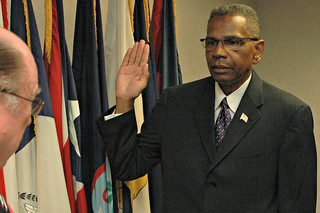The Savannah State University criminal justice professor knows what he's talking about. 
"Acquiring the knowledge, skills and abilities of college degrees, from the bachelor's level to that of the doctorate, equipped me with the appropriate tools to become successful in carrying out my duties and the community's expectations of a law enforcement officer while employed at the city, state, military and federal levels of government," he said.
Stewart began his criminal justice and intelligence career as a police officer while he was a student at Georgia State University in Atlanta. With the help of a faculty mentor, Stewart was able to find a position with the Bureau of Alcohol, Tobacco, Firearms and Explosives (ATF). From there, Stewart became a bombings and arsons supervisor and later an ATF field office Special Agent in Charge in Baltimore.
"When I first became a city police officer in the 70s, the focus was on traditional policing functions and responding to citizens outcries about violent crime," Stewart said. "We utilized the new philosophy of 'community-oriented and problem-based policing' to fight the 'drug wars' and the proliferation of street gangs in the 80s and 90s, while preparing for the era of terrorism that never really materialized. The beginning of the millennium brought police officers to serve as the front line against terrorism."
Stewart was appointed by the Clinton administration to the U.S. Treasury Department as Assistant to the Undersecretary of the Treasury (Enforcement). Later, Stewart became Senior Advisor to the Assistant Secretary for Law Enforcement Programs. He was a member of the United States Army Reserve, retiring at the rank of Lieutenant Colonel, and obtained law and doctorate degrees and began a new career teaching as a college professor after retiring from the ATF.
He later became Founding Dean of the College of Public Safety Administration at St. Petersburg College in Florida. He also provided daily leadership to the operations and academic functions that were related to the Southeastern Public Safety Institute (SEPSI), the Criminal Justice Institute, the In-service Training Academy, the Public Safety Service Academies, the Center for Public Safety Innovation and academic programs.
He was recently confirmed as U.S. Selective Service System State Director for the State of Georgia. Throughout his career, Stewart has been able to synthesize his academic and career experience in several landmark cases, including the: Oklahoma City bombing; Washington, D.C., sniper attacks; 1993 World Trade Center bombing; and the Ruby Ridge case. Stewart also chaired a planning committee for the 1996 Atlanta Olympics, where his abilities were put to the test when an explosive device detonated.
"These assignments drew upon key areas of knowledge involving operational oversight, policy review, principles of homeland security and emergency management needed to carry out traditional police duties while also monitoring and preparing for disaster scenarios," he said.
Stewart emphasized seven key themes toward career search success: Speaking ability, listening skills, enthusiasm, writing skills, technical competence, appearance and poise. He also urged students to take advantage of networking opportunities, unpaid internships and volunteer work.
"A positive attitude is essential to success in anything you do, being a college student or participating in any chosen career field," Stewart said.
"If you want to succeed you need to have the right mindset: develop a passion for learning, become self-motivated, strive for perfection, become an effective problem solver, become a willing team player, get to know someone who is different from yourself, and smile often."
Stewart is working with START through the Department of Homeland Security Summer Research Team Program for Minority Serving Institutions. He is working with Laura Dugan on the GATE project. His work proceeds from the assumption that many of societal problems can be understood and solved with knowledge gained through a structured process of applied research.
His research evaluates city police departments that have developed new terrorism reduction initiatives, which have produced unusual successes after the 9/11 terrorist attacks. Specifically, he is analyzing factors that are used in determining whether thirteen chosen U. S. cities, and their police departments, should re-organize to operationally engage in any one or a combination of new policing strategies, i.e. internationalization of policing, high policing or homeland security policing.
These strategies are designed to generate actions regarding potential solutions to incidents and threats of terrorism for the noted communities through prevention, preparedness, response and recovery. He is consulting the Global Terrorism Database (GTD) to identify cities that qualify to comprise his units of analyses.
